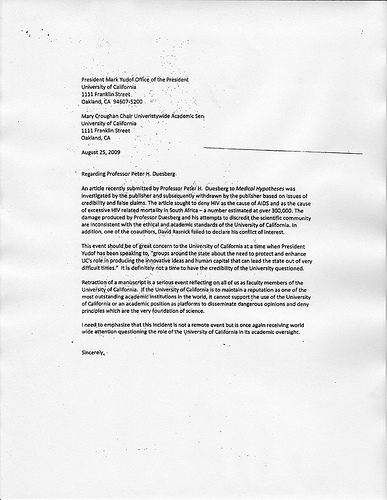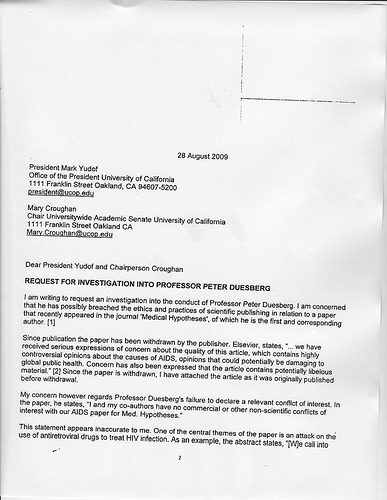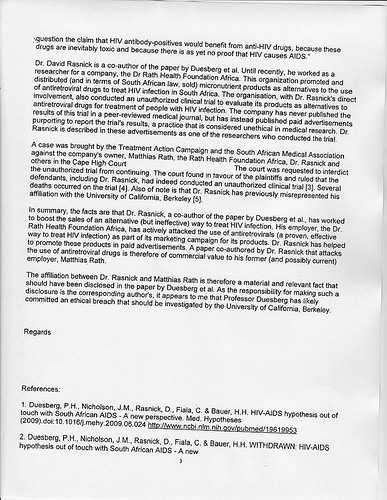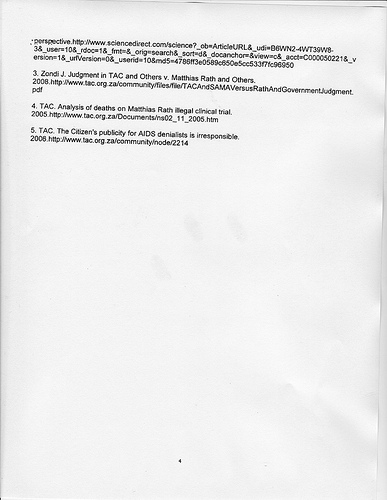In November, UC Berkeley launched an investigation of Professor Peter Duesberg for misconduct associated with a paper of his retracted from Medical Hypotheses. According to the letter sent Duesberg informing him of the investigation, there were two allegations. One was that his paper had been withdrawn by the publisher due to “issues of credibility and false claims.” The other was that “you failed to declare a relevant conflict of interest with regard to the commercial interests of your co-authors.” Duesberg tried to learn more about what he was accused of, without success. Finally the university sent him the letters of complaint that led to the investigation. Here they are.




The first letter is incredibly vague. The “issues of credibility and false claims” aren’t spelled out and it is unclear why the University of California should care that “Bruce Rasnick failed to declare his conflict of interest.” The idea that publishing a dissenting paper about AIDS is an “attempt to discredit the academic community” is worthy of Orwell.
The second letter has several strange features. First, it contradicts itself. It says:
[Statement 1] Until recently, he [Rasnick] worked as a researcher for a company, the Dr Rath Health Foundation Canada [owned by Mattias Rath] [Statement 2] [Rasnick’s] former (and possibly current) employer, Mattias Rath.
Statement 1 says Rasnick no longer works for Rath. Statement 2 says he might still work for Rath.
Second, its logic is outside the way conflict of interest is normally understood. Because you used to work for someone that might benefit from your paper, you now have a conflict of interest? This makes no sense.
Finally, there is the weird idea that because something is “possible” — Mattias Rath is “possibly” Rasnick’s current employer — it deserves a misconduct investigation. It’s possible that a flying saucer will land on the White House lawn tomorrow.
In spite of all this, UC Berkeley administrators allowed themselves to be used to punish dissent.
It does seem prudent to investigate when a paper is withdrawn by a journal, and I think I would have that policy if I were UC Berkeley. Wouldn’t you? (And speaking of Yoo, there are others I’d personally want to investigate first).
The particular journal is an odd duck as scientific journals go, because falsifying results is obviously not at issue, and I don’t know why the article was withdrawn. But it seems to me that whether or not this is punishing dissent depends more on how the investigation is conducted and its outcome than on the fact that there is an investigation, annoying as it will be for the target of the investigation in either case.
Kevin, UC Berkeley does not have a policy of investigating when a paper is withdrawn by a journal, as shown by the fact that this investigation was triggered by these letters, not by the withdrawal. To answer your question, I don’t think such a policy would be a good idea. This case illustrates why such a policy is a poor idea — because one giant publisher (Elsevier) is too susceptible to outside pressure and because UC Berkeley administrators seem to have trouble understanding basic concepts (here, conflict of interest).
This investigation is punishment, no doubt about it. If your investigators take seriously the notion that a conflict of interest exists because a co-author was previously employed by a company that might benefit from your paper, who knows what they might do?
Yeah, the Duesberg paper is basically a rebuttal to Chigwedere P, Seage GR, Gruskin S, Lee TH, Essex M (October 2008). “Estimating the Lost Benefits of Antiretroviral Drug Use in South Africa”. Journal of acquired immune deficiency syndromes. I don’t have access to this paper, but according to wikipedia, it implicates Duesberg in over 300,000 AIDS deaths in South Africa.
Incidentally, you should look at Duesberg’s wikipedia page, they actually have a section titled “Consequences of AIDS Denialism”. Humorously, they cite a newspaper article on the Chigwedere paper as a “independent study”, one study + a newspaper article on the study make 2 independent studies.
Seth – I’m not going to assert that Berkeley is well-run, because I don’t know, and I’m happy to concede that the people who instigated the complaint aren’t disinterested. Still, if you were an administrator and this came to you, with an article that was withdrawn by the journal that published, you really wouldn’t get a committee together to investigate it? Investigations and audits are a pain, but it’s a pretty mild sanction when compared with, say, the freedom that the tenure system gives faculty to publish unpopular views.
According to popular understanding Cheney had a conflict of interest when the US administration gave billions of dollars to Halliburton because Cheney previously worked in that company.
Working with a company means that you become friends with other people at the company and feel certain loyalty to them.
In politics much more harm is created by that sort of conflict of interest than by direct corruption where the politician profits directly.
It similar to your allegation that ghost writing is plagiarism.
You can have a very strict definition of plagiarism which doesn’t include plagiarism or you can have a broad definition.
Here they have a broad definition of conflict of interests.
ChristianKI, to find an example to convince me that “conflict of interest” applies to someone who employed you three years ago you’ll have to find a less unusual case. There are thousands of conflict of interest statements published every week in scientific journals; I have never seen one that mentioned someone who employed the author three years ago. And even with your broad definition of conflict of interest, it is still harassment/punishment for the simple reason that no one is ever ever investigated for it. Just as no one — unless you happen to be black — is ever pulled over for driving one mile over the speed limit.
I don’t follow your point about ghost-writing. Call it plagiarism or not, it still reflects very badly on those med school profs who publish ghost-written articles without acknowledging the assistance. Those articles are supposed to be unbiased reviews of treatment options; they aren’t. They seriously mislead readers by making some drugs sound better than they are. That’s the crux of the problem, not “plagiarism”. The reliance of med school profs on drug money is a huge problem. People’s co-authors having been employed three years ago by a company that might benefit from their paper is not a huge problem.
Kevin, administrators should read letters of complaint they receive, yes. But these two letters aren’t convincing. They are too vague about what’s wrong with the paper and far outside normal usage when it comes to conflict of interest. As an administrator I would think three things: (a) The pair of letters reflects an organized campaign. The purpose of the campaign is to punish someone they disagree with. It has nothing to do with public health–the paper has already been withdrawn. (b) The complaints about “credibility” and the like are incredibly vague because there is nothing there. If there was something serious, it would have been made clear. (c) The conflict of interest complaint is not just absurd, it’s clearly harassment. The whole thing reeks of harassment for an unpopular view.
Seth, I suspect we just come to different conclusions from the same facts. I don’t think that investigation necessarily equals harassment; it all depends on how the investigation is done. The easy call is always to say that “where there’s smoke, there might be fire” and do an investigation. I don’t think it’s warranted to conclude that either because the accusers have their own axes to grind or because they don’t lay out convincing evidence, that such evidence doesn’t exist. Often people who take small shortcuts also take larger ones (think “third-rate burglary”). I’m not accusing Duesberg of this, or anything else. But I think that I would have a strong bias toward putting together an investigation but trying to make sure the committee consisted of people who had both relevant expertise and no animus in either direction.
Coincidentally, I listened to a sad sermon last weekend in my local Catholic church presenting a very defensive attitude to the pedophile scandals, including calling attention to the anti-Catholic biases of many of the people who are making much of them. My reaction to that as well as this is, “so what?” You still need to investigate and respond to what you learn.
It’s a cost of doing business in any field that presumes a high level of trust in what people say or write. If academics and researchers are relied on to police themselves (and we are, to a large extent), we need to show that we investigate claims of abuse.
In this case, the withdrawal of the paper, for whatever reasons, is a concrete piece of evidence that’s pretty hard to ignore. I think investigating remains the responsible decision, even if the person who makes that decision thinks it’s likely to lead to no action.
I think that, if you were an administrator, you probably would go through the steps you list but then also say, “what if I’m wrong?” If the administrator is right in thinking there’s nothing to this, then Duesberg has to endure the unpleasantness of an investigation but can then say he was cleared by the University. If he’s wrong, then it’s *really* important that people can’t look back in the future and say that Berkeley swept this under the carpet despite multiple complaints and a withdrawn paper.
Or so it seems to me.
Kevin, you write “I don’t think investigation equals harassment.” I gather from this you have never been investigated — much less investigated by idiots who are capable of anything.
If UC Berkeley administrators wanted to be “cautious” they could have written back to the authors of these two letters and asked them to spell out exactly what was bad about the paper. The conflict of interest complaint is obviously ridiculous. I’ll say it again: the reason the “credibility” etc. accusation was so vague was because actual examples would have been unconvincing — would have appeared trivial.
“It’s a cost of doing business in any field that presumes a high level of trust.” Nobody is accusing Duesberg of making up data — that’s where trust comes in. You really do have to trust scientists to report accurately their data and not make up data. Theories, on the other hand, are inherently UNtrustworthy — and the withdrawn paper was about a theory. You don’t judge a theory by the institution from which it came, you judge it by evidence. There is no need to “trust” UC Berkeley professors when they propose a new theory, either it is supported by the evidence or it isn’t.
I am not overly concerned that UC Berkeley profs will come up with theories that turn out to be wrong. I am much more concerned that they will take refuge in careerism and fail to work on problems that the rest of us care about. There’s a reason for the term “ivory tower”. There’s a reason “pure” research is higher status than “applied” research. Because scientists tend to dislike being useful. Duesberg was the opposite of careerist and put forth a new idea on a question that the rest of us care about. I happen to disagree with him, but I am glad for the absence of careerism.
I am not overly concerned that UC Berkeley profs will come up with theories that turn out to be wrong.
Exactly! The question is not whether Duesberg is right or wrong (I have no idea) — but if he is to be allowed the academic freedom to question the conventional wisdom.
Read the third paragraph of the first letter. I have not read Duesberg’s paper, and don’t know enough about the topic to give an informed opinion even if I had, but reading that paragraph should tell you all you need to know about the motivations of the person or people behind this.
[…] Geffen also alleges that co-author David Rasnick PhD should have reported his brief association with health advocate Matthias Rath MD. To assert that a co-author’s relationship (that ended is 2006) represents a punishable conflict of interest against Duesberg is absurd — especially when considering the breathtaking conflicts of his accusers and employer. […]
The Semmelweis society fully supports the investigation into Duesberg’s misconduct. Futhermore, a vote has been taken to sign on any petition to have Duesberg’s conduct sanctioned. The entire membership has voted to strip Duesberg of any award previously given.
Semmelweis has launched its own investigation of Duesberg’s misconduct, and we find that his misconduct is real. Clark Baker has used under-handed tactics to steal our website. However, do not be fooled by Baker’s identity theft. We fully support the best care possible for AIDS patients.
Duesberg – “conflict of interest” – Some of the above writers may have a conflict of interest but if Duesberg has a conflict of interest it is for a lot less money than his attackeers. Who is this Semelweis – “we find his misconduct is real” – take it easy buddy, finish the investigation first. The best care for AIDS patients may just be to not load them up with something too dangerous to give to cancer patients ( the intended patients of AZT).
well – looks like duesberg is in the clear. the university concluded the investigation and found duesberg at no fault.